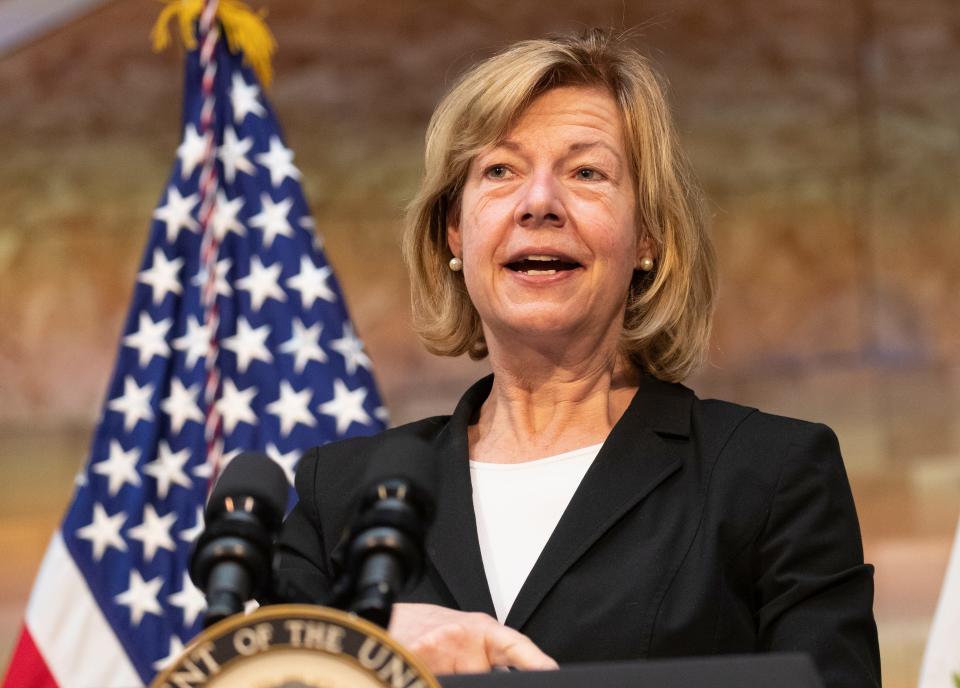Wisconsin lands $49 million in funding for medical sciences. Baldwin says thousand of jobs possible

More than a dozen Wisconsin businesses, colleges and economic development agencies are slated to share $49 million in federal funding for a medical sciences technology hub expected to create thousands of jobs.
The funding, announced Tuesday by U.S. Sen. Tammy Baldwin, will focus on biotechnology and personalized medicine at companies and universities which are largely located in the Milwaukee and Madison areas.
Personalized medicine uses a person's genetic profile to guide medical decisions about the prevention, diagnosis, and treatment of diseases.
The funding was awarded through the 2022 CHIPS and Science Act. Over the first 10 years, the Wisconsin tech hub designation is projected to create more than 30,000 direct jobs. Additionally, it is projected to create $9 billion worth of economic development in the state and 111,000 indirect jobs, according to Baldwin.
Nationwide, CHIPS and Science Act funding aims to encourage and support creation of regional technology hubs to spur scientific advances and bolster domestic research, manufacturing and jobs.
In Wisconsin, it will allow the public and private partnerships to boost research, expand lab space, increase collaboration, and invest in workforce development.
“Today’s announcement recognizes our state’s rich history of innovation and manufacturing and doubles down on our state’s potential to be a major player in the next chapter of an up-and-coming industry,” Baldwin said in a news release.
The Wisconsin Biohealth Tech Hub Consortium members include the Wisconsin Economic Development Corporation (WEDC), the University of Wisconsin System Administration, the University of Wisconsin-Madison, GE HealthCare, Rockwell Automation, Exact Sciences Corporation, BioForward Wisconsin, Employ Milwaukee, Accuray, Plexus, WRTP Big Step, Milwaukee Area Technical College, Madison Area Technical College, the Madison Regional Economic Partnership (MadREP), and Milwaukee7.
About $500 million awarded to numerous states by Biden administration
Tuesday’s announcement for Wisconsin was part of broader announcements from the Biden administration which said it has awarded $504 million for a dozen “Tech Hubs” in different states.
The hubs in Wisconsin, Indiana, and New Hampshire are focused on biosciences and medicine. Hubs in other states are focused on areas including clean energy, chip manufacturing, and climate change-resistant infrastructure.
The funding will be split across the 12 hubs, which are just under half of the ones President Joe Biden designated in 2023 under the CHIPS and Science Act.
Wisconsin companies are well positioned for advances in technologies and breakthroughs in personalized medicine under the Tech Hub, according to Blake Moret, chairman and CEO of Milwaukee based Rockwell Automation.
Rockwell designs and builds factory systems for nearly every industry imaginable. For more than a century the company and its predecessor, Allen-Bradley Corp., have had a unique window into manufacturing and sciences.
More companies are adopting a “digital twin” of a manufacturing process -- a computer model for testing ideas before they’re implemented on the shop floor. You could push the virtual system to its breaking point without any consequence, damage or interruption to the real thing.
“You hear a lot about concepts like the creation of digital twins that add flexibility, being able to ensure that processes are secure for cybersecurity reasons,” Moret said. “And all of this will result in a more flexible approach to these cutting-edge technologies, that ultimately reduces the cost of being able to bring these things to the market and to benefit people,” he said during a Tuesday afternoon press conference on the Tech Hub.
The CHIPS and Science Act marks a substantial ramp-up of industrial policy in the United States, according to the Chicago Council on Global Affairs, a nonpartisan think tank.
The legislation is sparking a great deal of investment activity in the U.S. semiconductor sector, but several challenges and potential pitfalls lie ahead, according to the Council.
“Supporters see the policy—and the far-larger Inflation Reduction Act — as a much-needed investment in critical technologies at a time of growing geopolitical friction and climate change. However, some critics fault them for attempting to pick winners and losers in the marketplace, expanding the federal debt, and pursuing too many policy objectives,” the Council says.
This story will be updated.

This article originally appeared on Milwaukee Journal Sentinel: Wisconsin lands $49 million for biotech hub that could boost jobs